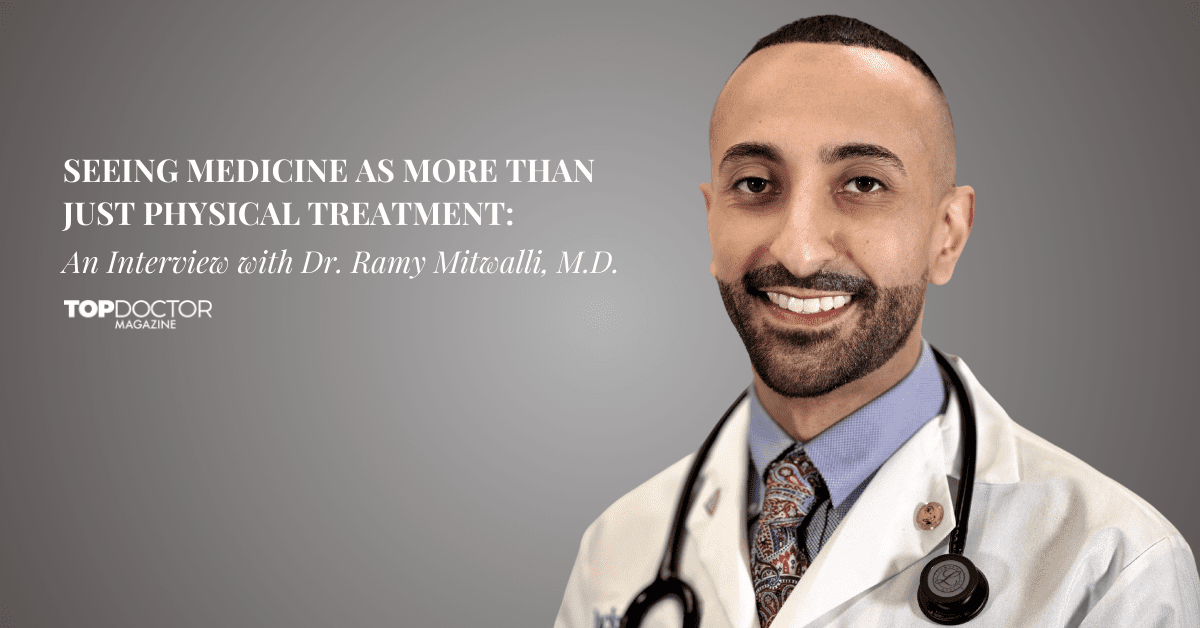Dr. Ramy Mitwalli, M.D., M.B.A., M.Sc., M.S.P., found his passion for medicine at a very young age. At just 13 years old, Mitwalli experienced his father lying paralyzed in a hospital bed after shoulder surgery. The doctors discovered that his father suffered from a metabolic condition that resulted in a 10-hour succinylcholine-induced paralysis after his shoulder surgery. At that moment, Mitwalli knew he was called to the medical field because he wanted to help alleviate pain and not feel as helpless as he did.
Throughout his father’s treatments, Mitwalli was drawn to his knowledge in the medical field. He could thoroughly explain his father’s conditions to the nurses and doctors who mistakenly asked if he was a doctor multiple times. As he grew in his knowledge through his father’s medical history, Mitwalli found his calling for life in the medical field.
Mitwalli had watched his father practice veterinary medicine his entire life, which abruptly ended after several hospitalizations. But that exposure to medicine would also prompt young Mitwalli to seek out the medical field.
He attended the University of South Florida, completing his undergraduate studies and receiving a B.Sc. in Biomedical Sciences. Then Mitwalli completed his first master’s degree from Georgetown University, earning an M.Sc. in Pharmacology (M.S.P.) with a dual concentration in Neuropharmacology & Research Pharmacology. Then, he received his M.B.A. in Healthcare Management from the Chapman Graduate School of Business at the Florida International University. He then completed a third master’s degree: M.Sc. in Entrepreneurship in Applied Technologies from the U.S.F. Center for Entrepreneurship at the U.S.F. Muma College of Business. Mitwalli graduated from medical school at Poznan University of Medical Sciences with his M.D. in May of 2022, with aspirations to be a physician leader. Dr. Mitwalli envisions his future in academia, healthcare governance, and private practice. In addition, he wishes to use his vast knowledge and experience in the medical field to advocate for patient education & financial literacy for medical professionals.
“My ultimate goal is to practice interventional and vascular radiology and subspecialize in neuroradiology and interventional pain management,” he said.
But being a medical professional is not a cheap process. There is a business side to medicine that Dr. Mitwalli felt was vital to fully understanding what it meant to be in the field.
“There’s a science to business. If one can complete the study of medicine, I believe they can understand finance and basic business operations,” he said.
The medical field encompasses so much more than just physical well-being. Dr. Mitwalli feels that the focus in the medical field should be on the mind, body, and spirit, not just another pathology of a physical body. Regardless of the condition, every patient must be seen as a single, interconnected mind-body-spirit — that is, a patient.
“That’s one thing: whenever we say holistic care, we generally associate it with a mind-body experience. So how can we so casually neglect one-third of our patients?” Dr. Mitwalli asked. “Their spirituality is one-third of their existence – arguably may hold the greatest potential of all.”
As he recalls from his study of Pharmacology at Georgetown, Dr. Mitwalli mentioned that when a patient is given a placebo effect, about 30% of the time, there will be a physiological or psychological manifestation of what they believe to be what they had received when they got the placebo. As a result, their brain actually manifests a reaction that the original drug should have induced.
“It’s fascinating. This phenomenon shows you the power of the mind. Our brain is an organ, finite in its physicality. Meanwhile, a patient’s spirituality holds relatively infinite potential. So we should address ailments of the spirit if we can. And this becomes particularly important as we approach the end of life care or work to improve the quality of life for patients in hospice and palliative care. Suppose a patient feels the need to talk about their spirituality and wants to talk about it. In that case, resources should be available to attend to specific spiritual needs,” Dr. Mitwalli said. Spiritual care requires the availability of Chaplains and access to Chaplaincy Services — since your average medical provider is neither adequately trained nor qualified to address patient spiritual needs. Spiritual care must involve Chaplains as integral members of a multi-disciplinary medical care team — to adequately address patients’ spiritual needs.
In medical licensing examinations, examinees are allotted approximately 15 minutes to take a complete patient history. We are primed to generate high patient volumes. This is the nature of a fee-for-service system. There has never been a more opportune time for policymakers and medical providers to discuss more qualifying value-based healthcare. How can 15 minutes render a personalized experience? Especially with providers being boggled by overzealous, rigid policies; and burnt out by ever-evolving superfluous administrative tasks. Dr. Mitwalli believes that balance is key. The medical industry must invest resources in both providers and patients alike. This will focus on personalizing care and being more personable with patients to ensure they receive the care they need. In addition to price transparency, Dr. Mitwalli advocates for patient health literacy and education. He emphasizes the critical role it plays for patients to understand the entire nature of condition(s), procedure(s), and all associated costs. Only then can a patient truly make the most educated decision regarding treatment. Otherwise, we are sentencing our patients to a vicious debt collection and litigation cycle.
Currently, Dr. Mitwalli is working on becoming a licensed physician in the U.S.A., European Union, and Egypt. In addition, he volunteers his time at local medical clinics and various nonprofit organizations. As an avid medical researcher, Dr. Mitwalli works on multiple research projects globally. He has active research projects based in the U.S.A., Poland (where he graduated medical school), and Egypt (where his family migrated from in the early 1970s). Dr. Mitwalli is not your average doctor who wants only to practice medicine; he aspires to be a change agent, an empathetic leader who leads by example.
“There’s definitely a future for me in health policy, healthcare management, and education. I really want to push for patient advocacy because I feel that we are losing the essence of medicine by looking at numbers rather than the patient as a person. And today, a patient is just ID 1, 2, 3, 4, 5. So many organizations have corporatized medicine to the extent they don’t even see a patient as their name, a person, or a family member. And I would like it when a medical provider sees my family member as a person. So, patient advocacy is vital,” Dr. Mitwalli said.






0 Comments